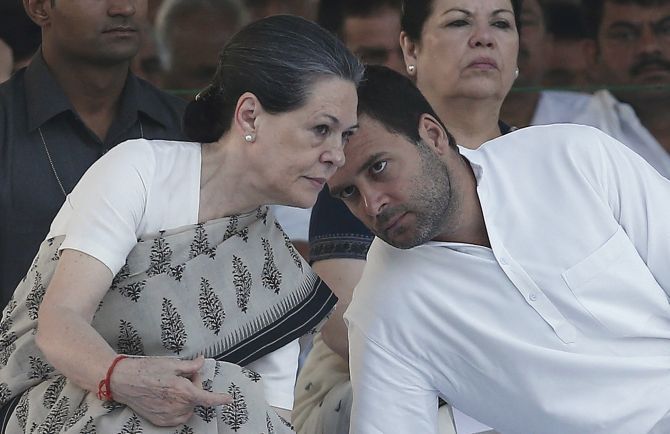Why, centuries after the French Revolution promised an end to feudalism, do political dynasties persist -- even in democracies, asks Ajit Balakrishnan.

In America, election season is in full swing and you cannot escape the din of battle, whatever else you are doing.
But what does not fail to surprise me is that, in a country with so many talented people, the contest seems to be consolidating around Jeb Bush, brother and son of former presidents, and Hillary Clinton, wife of another former president.
What has come of the ideals of democracy that the world's leading democratic country has to pick the leader from among relatives of former leaders?
Such a practice was something that the world looked on with amusement in countries such as India where Jawaharlal Nehru and his descendants have held sway over the Congress party for decades and supplied prime ministers or the powers behind the throne.
Or in other Third World democracies such as Argentina, where President Cristina Fernández de Kirchner (wife of former president Nestor Kirchner) ruled; or in Thailand, with Prime Minister Yingluck Shinawatra, (sister of former prime minister Thaksin Shinawatra); or Malaysia with Prime Minister Najib Razak (son of former prime minister Abdul Razak); or the Philippines.
Or Burma, where the first green shoots of democracy are being heralded in by Aung San Suu Kyi, with her party the National League for Democracy having won a majority of the seats in that country's first openly contested election in 25 years. She is the daughter of Burma's founding leader, General Aung San.
The rise of rank outsiders like Narendra Modi or Barack Obama seems to be true exceptions.
Democracies are supposed to be places where every citizen has an equal chance of making it in life, then what explains this wave of dynastic leaders throughout the world?
Yoes Kenawas, after surveying the scholarly literature on why dynasties persist in democracies, points to several different reasons.
In countries such as Indonesia, Philippines and Bangladesh, he says that scholars attribute it to weakness in the institutional structures of political parties; they are merely leaders with their band of followers, with no process of leadership transition.
When this co-exists with a large part of the electorate living in difficult if not destitute economic conditions, it provides dynastic politicians who are incumbents with an opportunity to play patronage politics.
This can be further reinforced when, because of historical reasons, local landed strongman oligarchs are more powerful than the central government. Mexico is often presented as an example of this. The national government is then dependent on these oligarchs who then propose their family members as candidates for political posts.
The local oligarchs use techniques like informal coercive-repression, conspiring with local law enforcement agencies, mobilising local government apparatuses and physical resources, and exploiting the local government budget for targeted social aid to maintain their power base.
This ‘subnational authoritarianism’ (to use a phrase coined by Prof Edward Gibson) can co-exist with a national-level democratic system in such countries.
What accounts for dynasties in the United States where such ‘subnational authoritarianism’ is hard to get away with?
The process may work differently in the United States, but the grip of dynasties is not that different.
The Washington Post is often quoted in discussions like this one about what they said in a 2005 article: 'With at least 18 senators, dozens of House members and several administration officials boosted by family legacies, modern-day Washington sometimes resembles the court of Louis XIV without the powdered wigs'.
The article went on to quote David Rohde, a Michigan State University political scientist, who said that what perpetuates dynasties in America is 'a combination of name recognition and access to money' that sons and daughters of political dynasties have -- and that both of these factors are critical in a system where campaigning requires buying television time and other expensive forms of advertising.
What could be the reason for the extensive dynastic political system that we see in India, starting with the Congress and now extending to other parties?
Professor Pradeep Chhibber of the University of California and others, in their book Religious Practice and Democracy in India, say that two factors drive dynastic politics in India.
The first is the absence of rules and procedures fostering internal democracy within political party organisations.
The second is that dynastic tendencies increase when the collection and distribution of funds (often illegal) is centralised: none dare challenge the central power in the party least they be cut off from all electoral funding.
Both these factors are realities of life for practically all political parties in India.
In addition, in India, practically all organisations, be they big business or small proprietary firms or the ‘professions’ (doctors, lawyers, chartered accountant firms) -- not to mention media companies -- are unabashedly family owned and dynastic.
So, probably, everyone believes that dynasties are the way the world works -- why look for any other way?
If political dynasties are so omni-present, what do we make of the promise of the French Revolution of the late 18th century which is what gave the world a vision of life which was different from the feudal, dynastic one? Was it a false promise?
I suppose the correct answer to that would be what the famous story about what the late Chinese premier Zhou En Lai is supposed to have replied to Henry Kissinger when Kissinger asked him in their 1972 meeting what the meaning of the French Revolution was.
Zhou's supposed reply: “It's too early to say”.
Ajit Balakrishnan, the founder and CEO of rediff.com, is the author of The Wave Rider: A Chronicle of the Information Age. Email: ajitb@rediffmail.com










